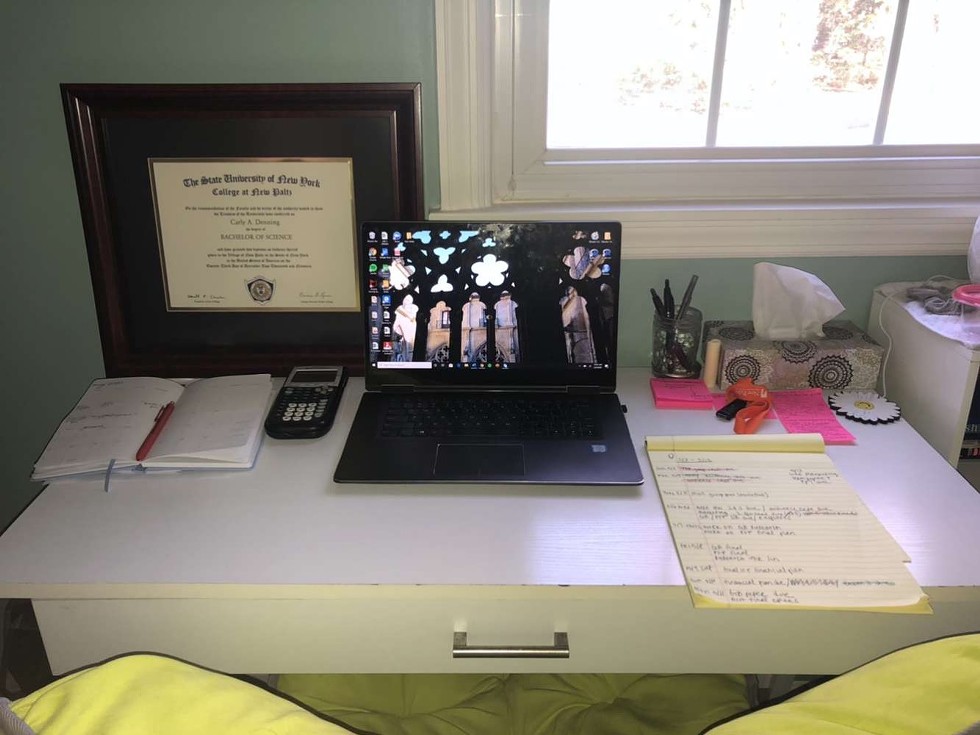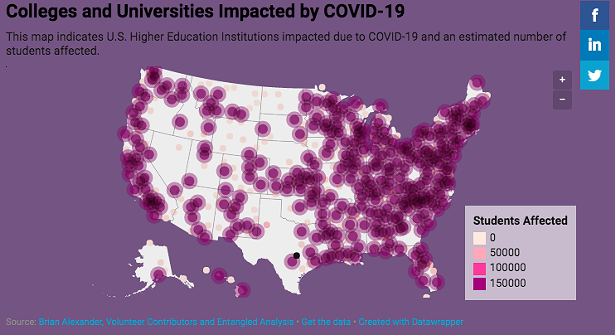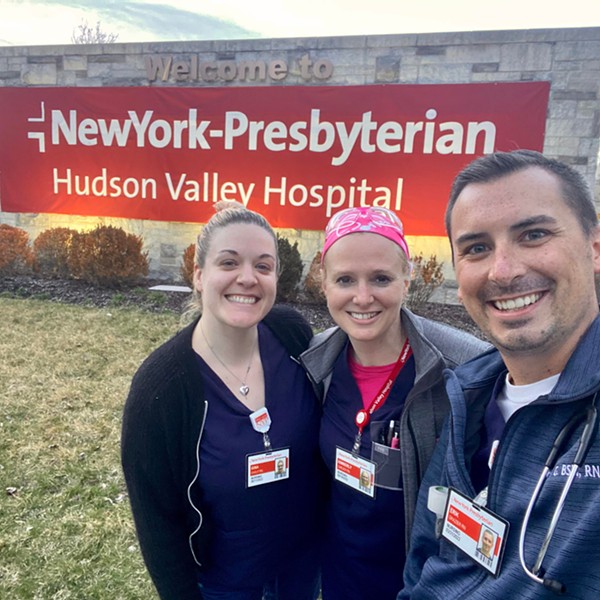“Nothing feels real,” says Abby Foster, whose senior year at SUNY New Paltz had been interrupted by the coronavirus pandemic. “It was almost like I had forgotten that I was still in college. I kind of gave up, if I’m being honest. My professors said that they wouldn’t fail anyone due to the unforeseen circumstances, so I didn’t even hand in my final papers…Now I’ve just been focused on trying to find a job, even though no one is really hiring at the moment.”
Foster is not alone: She is one of nearly four million college graduates in the class of 2020 trying to navigate the passage into adulthood while dealing with an unprecedented public health crisis.
As colleges across the country shut down in response to the pandemic, students were sent home to finish the semester remotely and adapt to new methods of education. At the same time, they had to deal with the cancelation of graduation ceremonies and disruption of professional-development opportunities, with internships interrupted and the job market suddenly barren. The total upheaval of daily routines and the dramatic shift to online learning became the new reality for almost every student across the country.
As a 2020 graduate myself, I know personally how heartbroken and overwhelmed we seniors felt as the uncertainty in our daily lives began taking hold. Things were changing at a pace that felt impossible for most of us to keep up with. Suddenly, thoughts about Friday night plans were replaced with anxieties about what the future would hold for what little we had left of our college lives and the job search to come.
Future Uncertainty
Generation Z was already the most stressed out generation in America. The 2019 Stress in America annual survey from the American Psychological Association found that “zoomers” report the highest average stress level of any generation, with work and money the two most significant sources of stress. They’re also the least hopeful about the country’s future. (The 2018 edition of the study, subtitled “Meet Gen Z,” found that “America’s youngest adults are most likely of all generations to report poor mental health.”)
And that was before the pandemic, which may end up as the most destabilizing event in a turbulent decade that has served as the formative years for my generation. What does the future look like for Gen Z now?
Beyond uncertainty about their individual chances at landing a job, some grads are also preparing to enter industries that may be completely changed or decimated by the coronavirus. The class of 2020 is entering the workforce right as the national unemployment rate is the highest it’s been since the Great Depression.
“I think many seniors that were already feeling anxious about stepping into the world, feel like they were suddenly thrown into a much more chaotic life and much sooner than originally anticipated,” says Kelly Nolan, a recent SUNY New Paltz graduate. “Not only do we now have to worry about graduating, many of us now are worrying about how we will properly support ourselves with the job market being as crazy as it is currently.”
Matt Erhard, a managing partner at the recruiting firm Summit Search Group, agrees that the job search for recent college grads is especially difficult right now. He says this time last year, the entry-level positions that give graduates a foot in the door have either disappeared or are going to those who would likely, under normal circumstances, be in higher positions, as a lot of businesses are either closed or operating at reduced capacity, with hiring freezes in place.
In addition to post-graduate stress related to job hunting, many students are experiencing economic hardship as social distancing orders have shut down businesses across the country, leaving millions without an income.
“I am currently living with my parents because I knew I would have to cut my hours back for student teaching and would not be able to live on my own,” says Emily Tabor, who graduated from SUNY Brockport with a degree in education. “I was thankfully allowed to defer my car payments until August, but it has been a month long battle [trying to file for] unemployment for the past month. I do not qualify for traditional unemployment because I did not make enough money at my job.”
Emotional Hardship
Even in times not disrupted by a global pandemic, the transition period from college to adulthood can be one of great anxiety and struggle for graduates. Although it’s not an official diagnosis, “post-graduation depression” is commonly used by mental-health professionals to describe the sadness and impaired functioning that recent grads report after they leave behind the world they created in college. “I can definitely tell my mental health is deteriorating,” Tabor says. “I always kind of feel like I am walking on a tightrope almost.”
The coronavirus is only making the typical post-grad blues worse. A recent study found that “coronavirus loneliness”—people who feel lonelier because of pandemic-related shutdown—is 34 percent higher among millennials than baby boomers.
“For [this class of] college seniors, the pandemic arrived during one of their most formative years,” says Mark Beal, a communications professor at Rutgers University. “They are missing out on graduation, the final semester of college, internships, and the traditional job-application and interview process. They are rightly worried that this pandemic and the life milestone experiences they are missing out on could negatively impact their career development and future.”
As an education major, Tabor was required to complete student teaching hours in order to graduate. Her teaching experience was cut short by the stay-at-home orders that shut down schools across the state in late March, and while Tabor is still awaiting word on ways she can make up those hours, she has noticed a general decline in her emotional wellbeing since moving home. She attributes her persistence to the students she teaches.
“I have dealt with depression for years and, as usual, some days are harder than others,” she says. “I do not have the best relationship with my family, so sometimes I feel claustrophobic. I rarely ever leave my room, but I try to keep myself composed for my students, and although I [only] spent about months with them, I have a strong connection with most of them…They give me a purpose in my everyday ‘life.’”
For transfer students, the shutdown shortened an already abbreviated amount of time on campus to form friends, make memories, and develop the identity each would carry into adulthood. Nolan, a recent graduate, transferred to SUNY New Paltz because it offered lower tuition and she was unimpressed with her previous college.
“Being a transfer student has its ups and downs,” she says. “You don't really have the same amount of time to make long-lasting memories or friends in a new college environment, and every second counts. If you’re like me, a little shy upon meeting new people, it may take time to acclimate. What's awful for me personally is that I finally felt things were coming together in my last semester and I was thriving and happy.”
Learning at a Distance
Sarah Reigrod is a recent graduate who majored in adolescent education at SUNY New Paltz. Like many other students, Reigrod had difficulty adjusting to a new way of learning.
“I’m really over school in general,” she says. “I feel like I’m not actually learning anything; I’m just plugging answers into an online quiz and forgetting about it.”
When COVID-19 first spread across the United States, people were forced to significantly alter their daily routines to abide by social-distancing protocols. Since college campuses are a hot spot for high volumes of people, administrators had no choice but to shut down in-person instruction and switch to remote learning.
While settling into this new way of learning, many students argued that the quality of remote education was lower than that of in-person classes. What’s more, some lacked the proper resources at home to complete assignments remotely—resources normally available to them on campus.
“My laptop broke at the beginning of the semester and I couldn't afford a new one,” says Tabor. “Unfortunately, while I am able to use my mother’s laptop for now, it looks like I will have to purchase a new one before I feel financially stable enough to do so.”
Just as students had to adjust to a completely new way of learning, their instructors have had to get used to remote learning too. The learning curve of online instruction was steeper for some educators than others.
“Online courses are confusing to so many of us and some professors are better than others with the technology, which makes some classes very frustrating,” Reigrod says. “With professors using different platforms for online learning, it can get overwhelming checking Blackboard, Google Classroom, and attending Zoom classes everyday.”
Along with technology adjustments, some professors share some of the same anxieties as their students when it comes to this new age of distanced learning.
“I’m very fearful that the pandemic will change higher-ed permanently,” says Lisa Phillips, associate professor of digital media and journalism at SUNY New Paltz. “Online learning will be seen as ‘Well, we’ve built it, so students might as well keep coming.’ That’s like saying the medical tent you set up in a war zone should now be the standard for hospitals. There are high-quality online-learning experiences, but they take a lot of work to develop, and the research is very mixed on outcomes.”
A Sudden Change in Plans
“Being at home, I miss the idea of what my final semester was shaping up to look like and I am saddened about not walking for my graduation,” says Nolan. “I am also anxious about online classes and how this will affect my GPA.”
Nolan, like others in her class, has to come to terms with her college experience unexpectedly ending. SUNY New Paltz delayed commencement ceremonies for the class of 2020 all the way until May of 2021, an entire year after the original ceremony was set to take place. In addition to commencement ceremonies and other in-person events being canceled, in some cases post-graduate plans for college seniors have also taken a back-seat while uncertainty of the future looms.
Emily Ereifej is a recent graduate of the University of Central Florida.“This virus changed a lot of my plans, and ruined a lot of them,” she says. “I had always planned to continue on to grad school in New York, but I didn't expect to move home this soon.”
Ereifej is a permanent resident of New York, which makes her an out-of-state student in Florida. As the enforcement of social-distancing orders was extended through the remainder of the school year, she faced additional complications for not being a resident of the state in which she studies.
“My lease ends in July and I’ve been home since March,” she says. “So far I’ve had to pay April and May rents and I’ll also be paying June and July without actually living there.”
While she’s stuck in a lease she can’t get out of, Ereifej has been trying for months to return to her apartment in Orlando to at least retrieve her belongings.
“Most flights have been canceled in order to prevent the spread of coronavirus, or just because there are not enough people [on the flight],” she says. “When I first came home in March, I didn’t expect to be home for this long, so I didn’t pack very heavy. Most of my stuff is still over there, including my car. If I would’ve known originally I would be home for this long, I would’ve packed a lot more stuff with me.”
Looking Ahead
While college seniors have been struggling to adjust to a world on lockdown and still prepare for their emergence into the workforce, some are finding the silver lining in a pandemic-ridden world.
“I got out of my toxic living situation in my off-campus housing, I finally had the time to do some spring cleaning, I lost 10 pounds so far, and I’m cooking more now that there isn’t much else to do,” says Reigrod.
Other students have sought for other ways on how they can continue to improve themselves while their dream is put on hold, which has the added benefit of keeping their own negative feelings at bay. Some have started their own online businesses, worked as freelancers, picked up new hobbies, and developed new skills.
And even though most college grads seem to be unsure of where to go next, some are ultimately optimistic and excited to see what a future after COVID-19 would look like. Could there even be some benefit to graduating amid a pandemic?
“While they will never get back their on-campus senior year experiences,” Beal says, “once corporate American opens for business and begins recruiting and hiring recent graduates, this resilient group of Gen Zers will be prepared and ready to compete for job openings and bring a refreshing and innovative perspective to their future employers unlike any generation before them.”




















